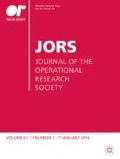Abstract
Scheduling with learning effects has received growing attention nowadays. A well-known learning model is called ‘position-based learning’ in which the actual processing time of a job is a non-increasing function of its position to be processed. However, the actual processing time of a given job drops to zero precipitously as the number of jobs increases. Motivated by this observation, we propose two truncated learning models in single-machine scheduling problems and two-machine flowshop scheduling problems with ordered job processing times, respectively, where the actual processing time of a job is a function of its position and a control parameter. Under the proposed learning models, we show that some scheduling problems can be solved in polynomial time. In addition, we further analyse the worst-case error bounds for the problems to minimize the total weighted completion time, discounted total weighted completion time and maximum lateness.

Similar content being viewed by others
References
Baker K (1974). Introduction to Sequencing and Scheduling. John Wiley: New York.
Biskup D (1999). Single-machine scheduling with learning considerations. European Journal of Operations Research 115 (1): 173–178.
Biskup D (2008). A state-of-the-art review on scheduling with learning effects. European Journal of Operations Research 188 (2): 315–329.
Cheng TCE and Wang G (2000). Single machine scheduling with learning effect considerations. Annals of Operations Research 98 (1–4): 273–290.
Cheng TCE, Wu CC and Lee WC (2008). Some scheduling problems with sum-of- processing-times-based and job-position-based learning effects. Information Sciences 178 (11): 2476–2487.
Janiak A and Rudek R (2007). The learning effect: Getting to the core of the problem. Information Processing Letters 103 (5): 183–187.
Janiak A and Rudek R (2008). A new approach to the learning effect: Beyond the learning curve restrictions. Computers & Operations Research 35 (11): 3727–3736.
Janiak A and Rudek R (2009). Experience-based approach to scheduling problems with the learning effect. IEEE Transactions on Systems, Man and Cybernetics, Part A 39 (2): 344–357.
Janiak A and Rudek R (2010). A note on a makespan minimization problem with a multi-ability learning effect. Omega 38 (3–4): 213–217.
Janiak A, Janiak W, Rudek R and Wielgus A (2009). Solution algorithms for the makespan minimization problem with the general learning model. Computers and Industrial Engineering 56 (4): 1301–1308.
Ji M and Cheng TCE (2010). Scheduling with job-dependent learning effects and multiple rate-modifying activities. Information Processing Letters 110 (11): 460–463.
Koulamas C and Kyparisis GJ (2007). Single-machine and two-machine flowshop scheduling with general learning functions. European Journal of Operational Research 178 (2): 402–407.
Lee WC, Wu CC and Hsu PH (2010). A single-machine learning effect scheduling problem with release times. Omega 38 (1–2): 3–11.
Pinedo M (2002). Scheduling: Theory, Algorithms, and Systems. Prentice Hall: Upper Saddle River, NJ.
Smith WE (1956). Various optimizers for single-stage production. Naval Research Logistics 3 (1–2): 59–66.
Sun L (2009). Single-machine scheduling problems with deteriorating jobs and learning effects. Computers & Industrial Engineering 57 (3): 843–846.
Toksari MD, Oron D and Güner E (2009). Single machine scheduling problems under the effects of nonlinear deterioration and time-dependent learning. Mathematical and Computer Modelling 50 (3–4): 401–406.
Wang JB (2009). Single machine scheduling with a time-dependent learning effect and deteriorating jobs. Journal of the Operational Research Society 60 (4): 583–586.
Wang JB and Liu LL (2009). Two-machine flow shop problem with effects of deterioration and learning. Computers & Industrial Engineering 57 (3): 1114–1121.
Wright TP (1936). Factors affecting the cost of airplanes. Journal of Aeronautical Science 3 (4): 122–128.
Yin Y, Xu D, Sun K and Li H (2009). Some scheduling problems with general position-dependent and time-dependent learning effects. Information Sciences 179 (14): 2416–2425.
Yang SJ and Yang DL (2010). Single-machine group scheduling problems under the effects of deterioration and learning. Computers & Industrial Engineering 58 (2010): 754–758.
Zhao CL and Tang HY (2010). Single machine scheduling with general job-dependent aging effect and maintenance activities to minimize makespan. Applied Mathematical Modelling 34 (3): 837–841.
Acknowledgements
We are grateful to the Editor and the referees for their constructive comments on an earlier version of our paper. This paper was supported in part by the NSC under grant number NSC 99-2221-E-035-057-MY3; in part by the Natural Science Foundation for Young Scholars of Jiangxi, China (2010GQS0003); in part by the Science Foundation of Education Committee for Young Scholars of Jiangxi, China (GJJ11143).
Author information
Authors and Affiliations
Rights and permissions
About this article
Cite this article
Wu, CC., Yin, Y. & Cheng, SR. Single-machine and two-machine flowshop scheduling problems with truncated position-based learning functions. J Oper Res Soc 64, 147–156 (2013). https://doi.org/10.1057/jors.2012.46
Received:
Accepted:
Published:
Issue Date:
DOI: https://doi.org/10.1057/jors.2012.46


